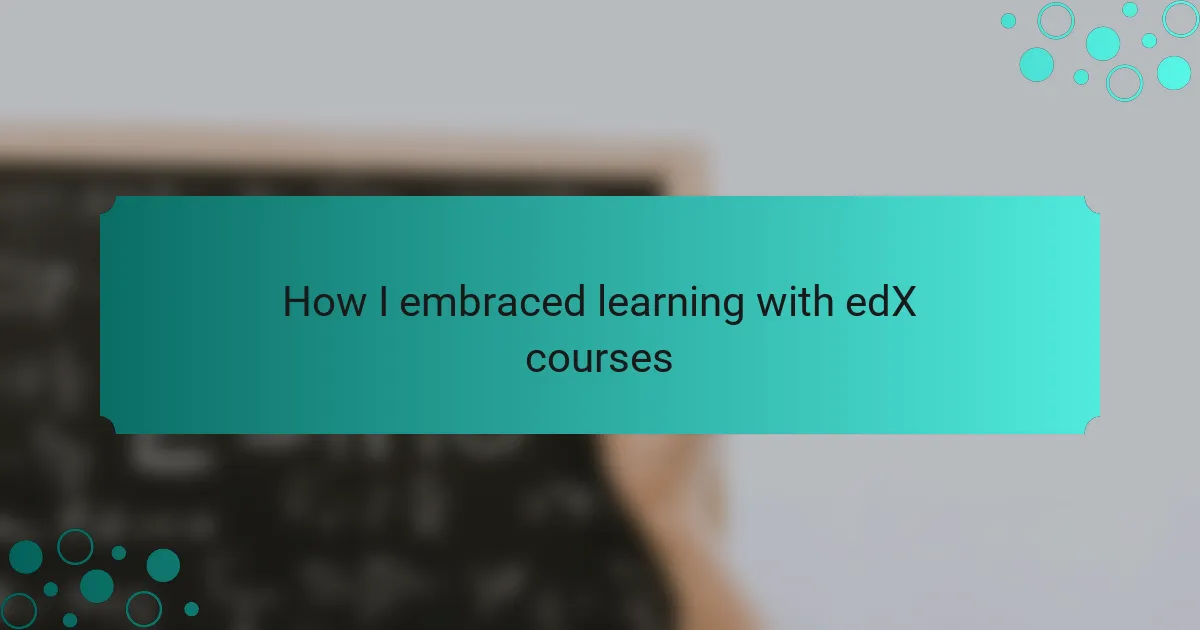Key takeaways
- edX courses provide high-quality online education in various subjects, developed by top universities with a focus on hands-on learning.
- Online learning offers flexibility, diverse course offerings, and the ability to connect with a global community of learners.
- Choosing the right course involves identifying personal interests, reviewing course content and feedback, and matching the format to one’s learning style.
- Maximizing learning can be achieved through setting clear goals, active participation in discussions, and allowing time for reflection.
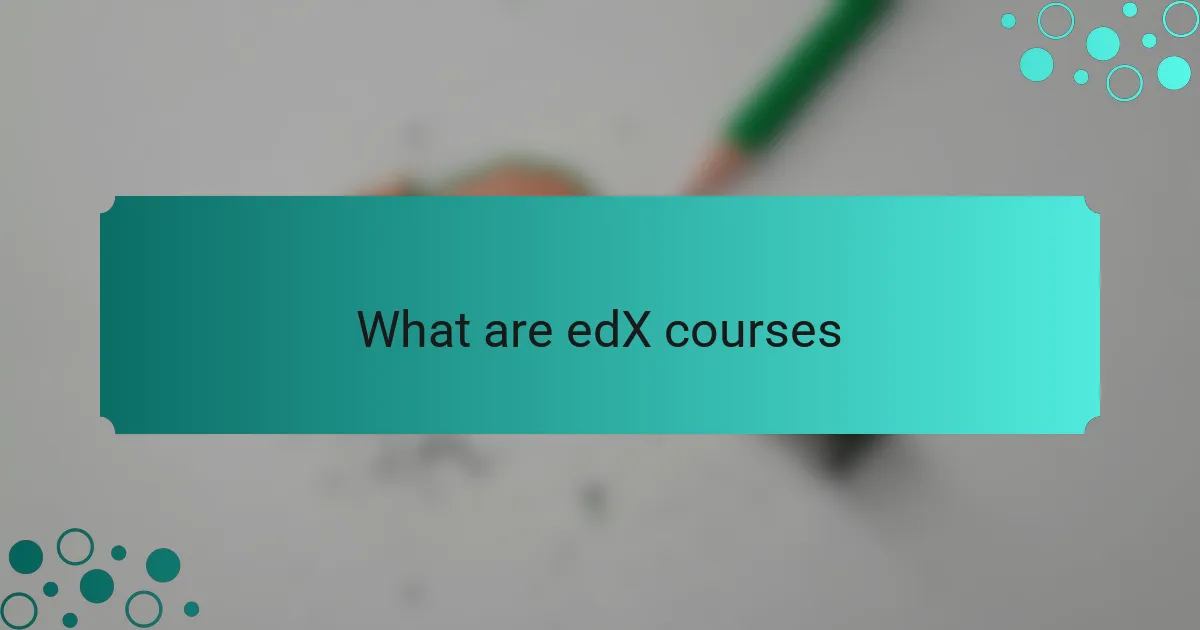
What are edX courses
edX courses are unique online learning opportunities that offer a wide range of subjects, including programming, data science, and engineering. Created through a partnership of top universities and organizations, these courses provide access to high-quality education for anyone, anywhere. I remember the first time I signed up; the feeling of opening up a world of knowledge was incredibly exciting.
What sets edX apart is its strong focus on hands-on learning combined with academic rigor. Here are a few key features that make edX courses stand out:
- Courses are developed by prestigious universities such as MIT and Harvard.
- Self-paced learning allows flexibility to fit studies into a busy schedule.
- Verified certificates enhance resumes and LinkedIn profiles.
- Interactive elements, like quizzes and discussions, foster community engagement.
- Financial aid options are available, making learning accessible to everyone.
Each of these elements has deepened my understanding and appreciation for the material, making my learning experiences feel rich and fulfilling.
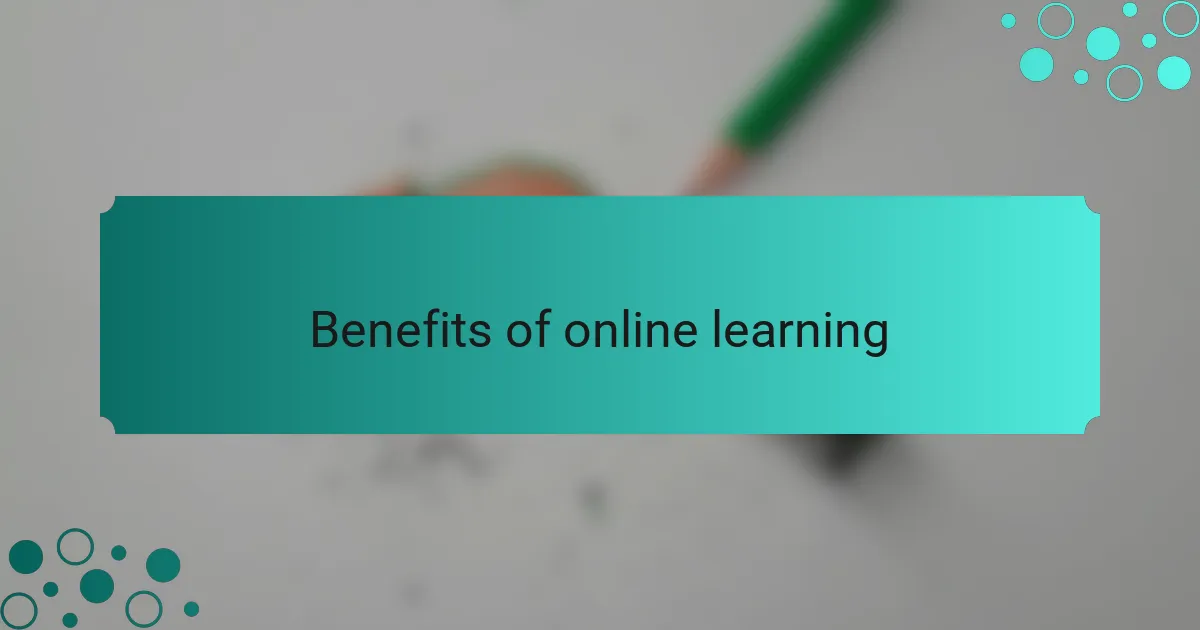
Benefits of online learning
Online learning, particularly through platforms like edX, has transformed my approach to education. The flexibility allows me to tailor my studying around my schedule, which I found invaluable when balancing work and personal commitments. It felt empowering to choose courses that truly excited me, like programming languages that I’ll apply in real-world projects.
Additionally, online learning fosters a sense of community despite the physical distance. I remember joining discussion forums where I connected with learners from various backgrounds. It was fascinating to hear their perspectives and experiences, making me feel part of a global classroom.
Benefits of Online Learning:
– Flexibility: Choose when and where to study, fitting education into your lifestyle.
– Diverse Course Offerings: Access to a wide range of subjects that spark interest, like computer science, data analysis, and beyond.
– Global Interaction: Engage with an international community of learners and instructors, enriching your understanding.
– Self-Paced Learning: Progress at your own speed, allowing for deeper comprehension of complex topics.
– Cost-Effective: Save on commuting fees and materials, making education more accessible.
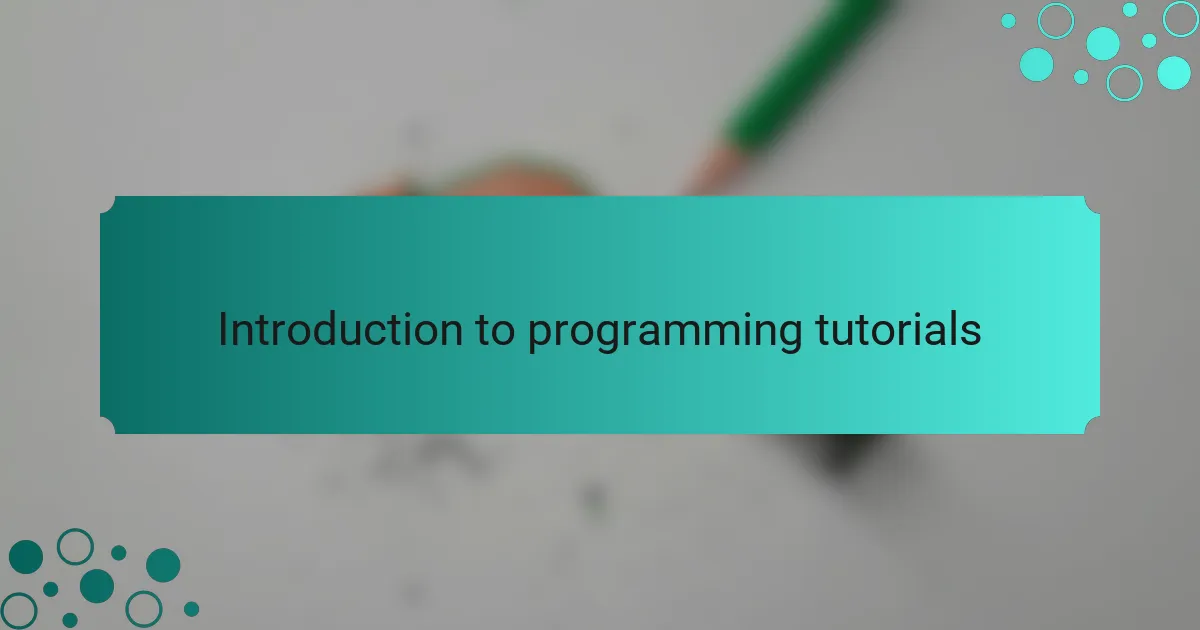
Introduction to programming tutorials
Programming tutorials are more than just lessons; they are gateways to problem-solving and creativity. I remember the thrill of my first programming tutorial—I was immediately drawn in by the way code could transform abstract ideas into functional applications. This hands-on approach helped me grasp concepts that once seemed daunting, like algorithms and data structures.
The beauty of programming tutorials lies in their ability to demystify complex topics. When I first encountered loops and functions, I felt a mix of confusion and curiosity. But as I progressed through step-by-step tutorials, those concepts began to make sense. The satisfaction of finally writing code that worked was a huge confidence boost and fueled my desire to learn even more.
What I found particularly engaging about programming is how it empowers you to create solutions. Each tutorial opened my mind to new ways of thinking. Have you ever experienced that eureka moment when a piece of code finally clicks into place? It’s moments like these that reinforce my commitment to continuous learning in this dynamic field, especially through well-structured tutorials that make challenging subjects more approachable.
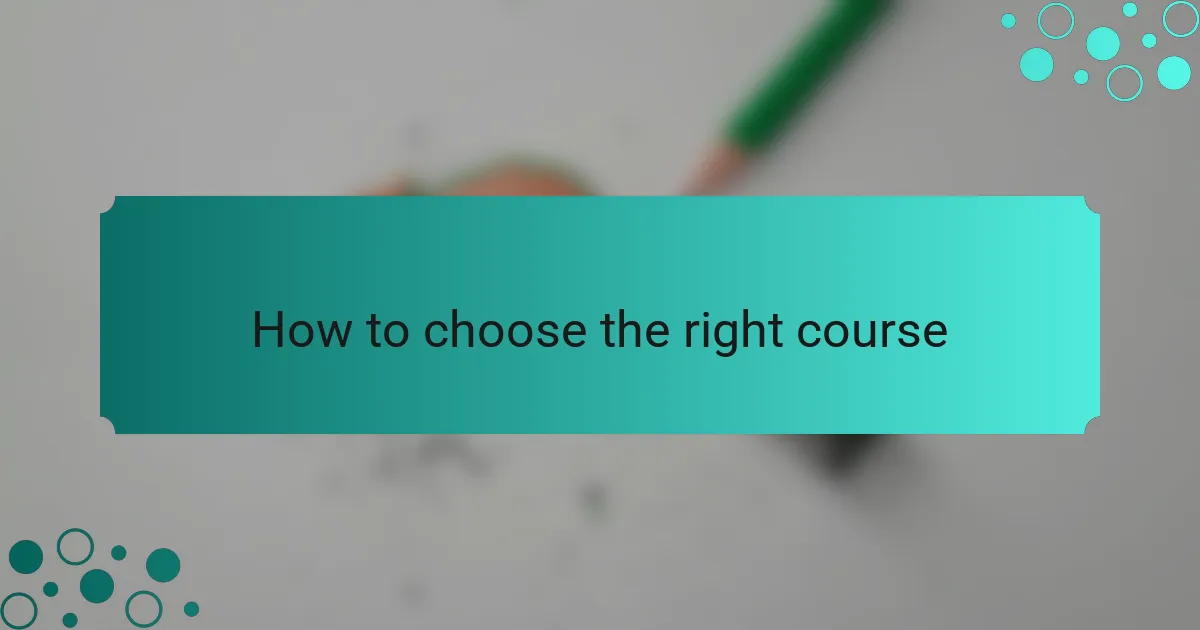
How to choose the right course
Choosing the right course on edX can feel overwhelming, but it doesn’t have to be. Start by identifying your interests and career goals. For instance, I remember sifting through options and realizing I wanted to focus on programming languages, as that was pivotal for my professional growth. What are you passionate about? Narrowing down subjects that excite you can make the selection process much clearer.
Next, take a closer look at the course descriptions and reviews. Each time I read about a course, I paid attention to the instructors’ backgrounds and learner feedback. I found that hearing from those who had completed the course gave me real insights into what I could expect. Are there specific topics that resonate with you? This knowledge can help you weigh the course’s value based on your personal and professional objectives.
Lastly, consider the format that suits your learning style best. Personally, I thrive with self-paced courses since they allow me to dive deep into the material at my own rhythm. Some learners prefer more structured timelines, while others thrive in interactive environments. Which learning style do you find most effective? Reflecting on your preferences can guide you toward a course that aligns with how you learn best.
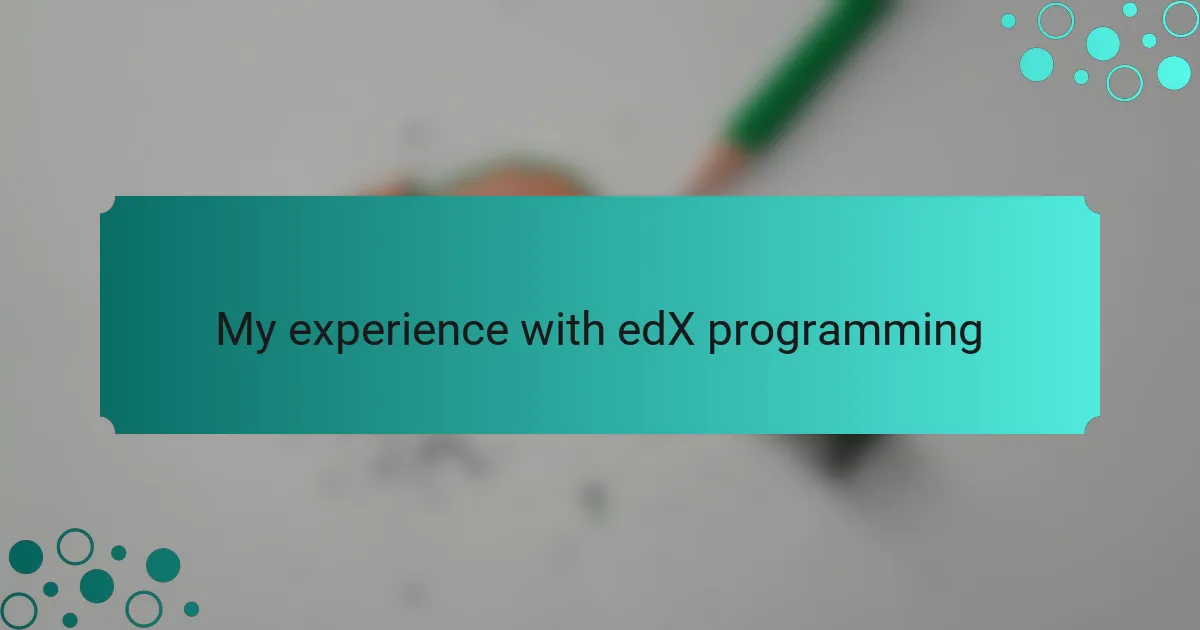
My experience with edX programming
Diving into edX’s programming courses was a game-changer for me. I remember the first time I opened a Python course; the initial excitement quickly mixed with a bit of anxiety. However, as I progressed through the lessons, the interactive exercises and real-world applications not only boosted my confidence but also ignited a genuine passion for coding.
One of the aspects I appreciated most was the flexibility of the platform. The ability to learn at my own pace meant I could balance work and life, fitting in study sessions during quiet evenings. This adaptability made the learning process enjoyable rather than overwhelming.
- Engaging course content that blends theory with practical applications.
- Access to resources from top universities, enriching my knowledge base.
- A supportive community where peer discussions kept me motivated.
- Opportunities to earn verified certificates, adding value to my resume.
- The chance to explore various programming languages, broadening my skill set.
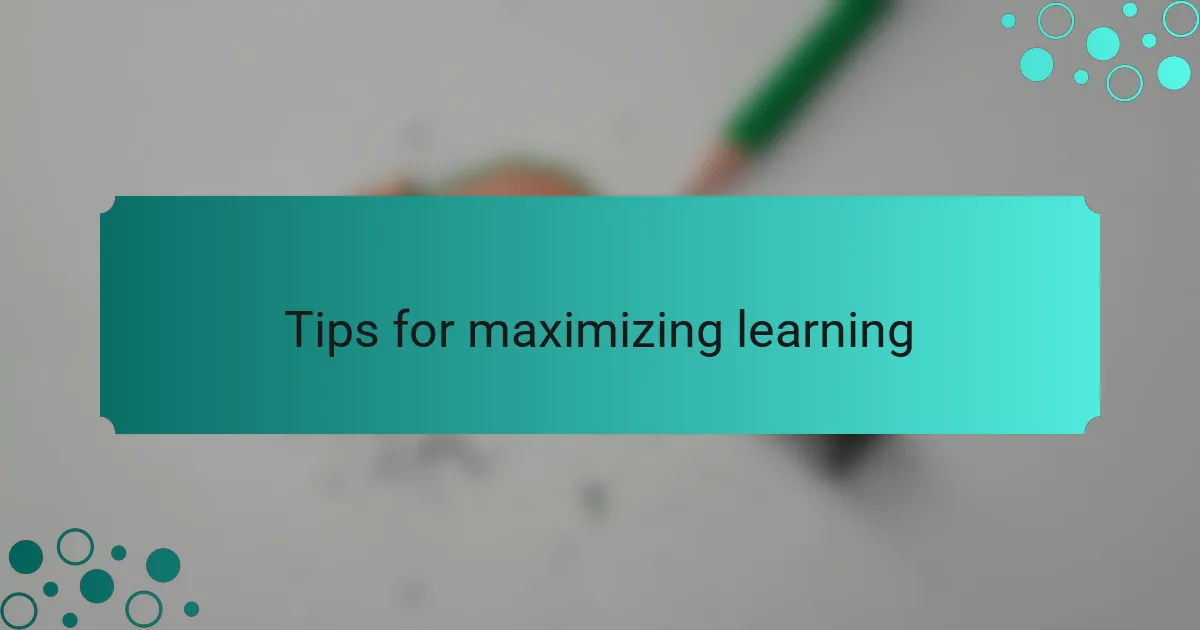
Tips for maximizing learning
To truly maximize learning on edX, I found that setting clear goals made a significant difference in my experience. Each time I enrolled in a new course, I wrote down what I hoped to achieve—not just in terms of skills, but also how I wanted to feel by the end. Did I want to feel confident in coding a project on my own? Or was I aiming to understand the underlying theories better? These intentions gave me a roadmap, guiding my focus and keeping my motivation alive as I navigated through the material.
I also discovered the power of active participation in discussions. Engaging with fellow learners transformed my education experience from a solitary journey into a collaborative one. Whether it was asking questions or sharing insights, every interaction enriched my understanding. I remember one specific discussion where a classmate’s perspective on error handling opened my eyes to a concept I had been struggling with. Have you ever had an “aha!” moment like that? Those connections can clarify complex ideas and make the learning process more enjoyable.
Lastly, don’t underestimate the importance of taking breaks and allowing time for reflection. I’m often tempted to push through and complete a module in one sitting, but I learned that stepping back helps me absorb the information better. After I finish a lesson, I like to take a moment to jot down what I learned and how I can apply it. This practice not only cements the knowledge but also reignites my enthusiasm for the next course. Have you found ways to process what you’ve learned? Reflecting on your journey can truly deepen your understanding and fuel your passion for continuous learning.
